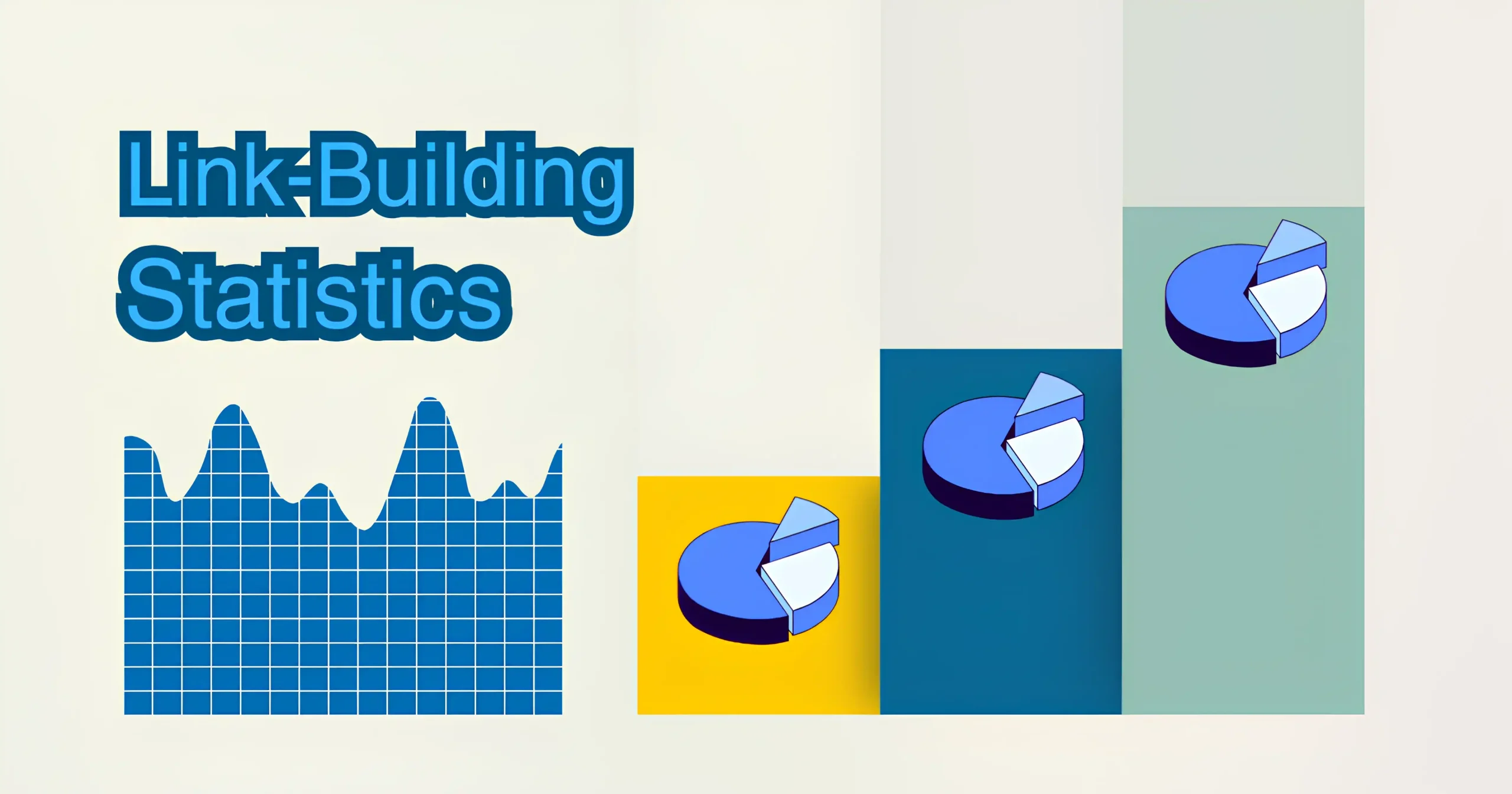Updated January 11, 2026
How Long Does SEO Take? 100+ Statistics for 2026
Explaining that SEO is a long-term investment is sometimes more challenging than designing a custom SEO strategy from scratch. My colleagues can attest that 5 out of 10 SEO clients struggle with patience, expecting immediate results rather than understanding the gradual process of organic growth. As an SEO expert or agency owner, you’re all too familiar with the tough questions: “Why aren’t we ranking first?” “Are we doing everything right?” or even, “Should we hit pause on our efforts?”
Instead of reinventing the wheel, I’ve gathered over 100 up-to-date statistics that clearly demonstrate the timeline of SEO success. By combining my own research with industry data, I’ve created a definitive resource that lays out exactly how long SEO takes to deliver results. Read on to discover the facts that will help you set realistic expectations.
Overall SEO Timeline
60% of SEO practitioners claim they see initial ranking improvements in about 4 to 6 months.
The average time to rank for different types of businesses (small, medium, enterprise) comparing established and new sites.
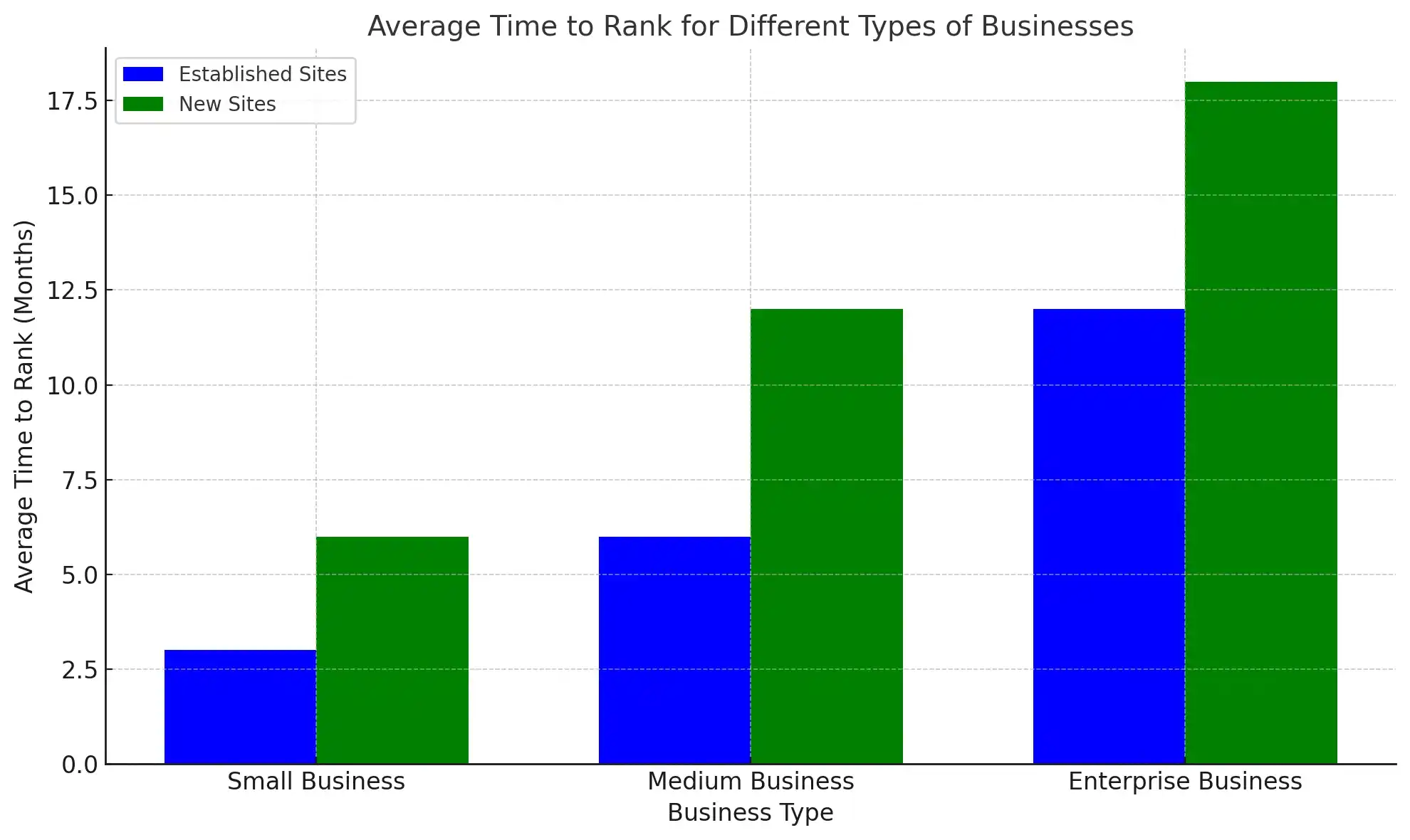
72% of digital marketers say that noticeable traffic growth typically appears within 5 to 7 months.
40% of small-business websites see no major ranking changes until after 9 months of consistent SEO effort.
1 in 5 websites never achieve top 10 rankings because they abandon SEO efforts too soon (within 2–3 months).
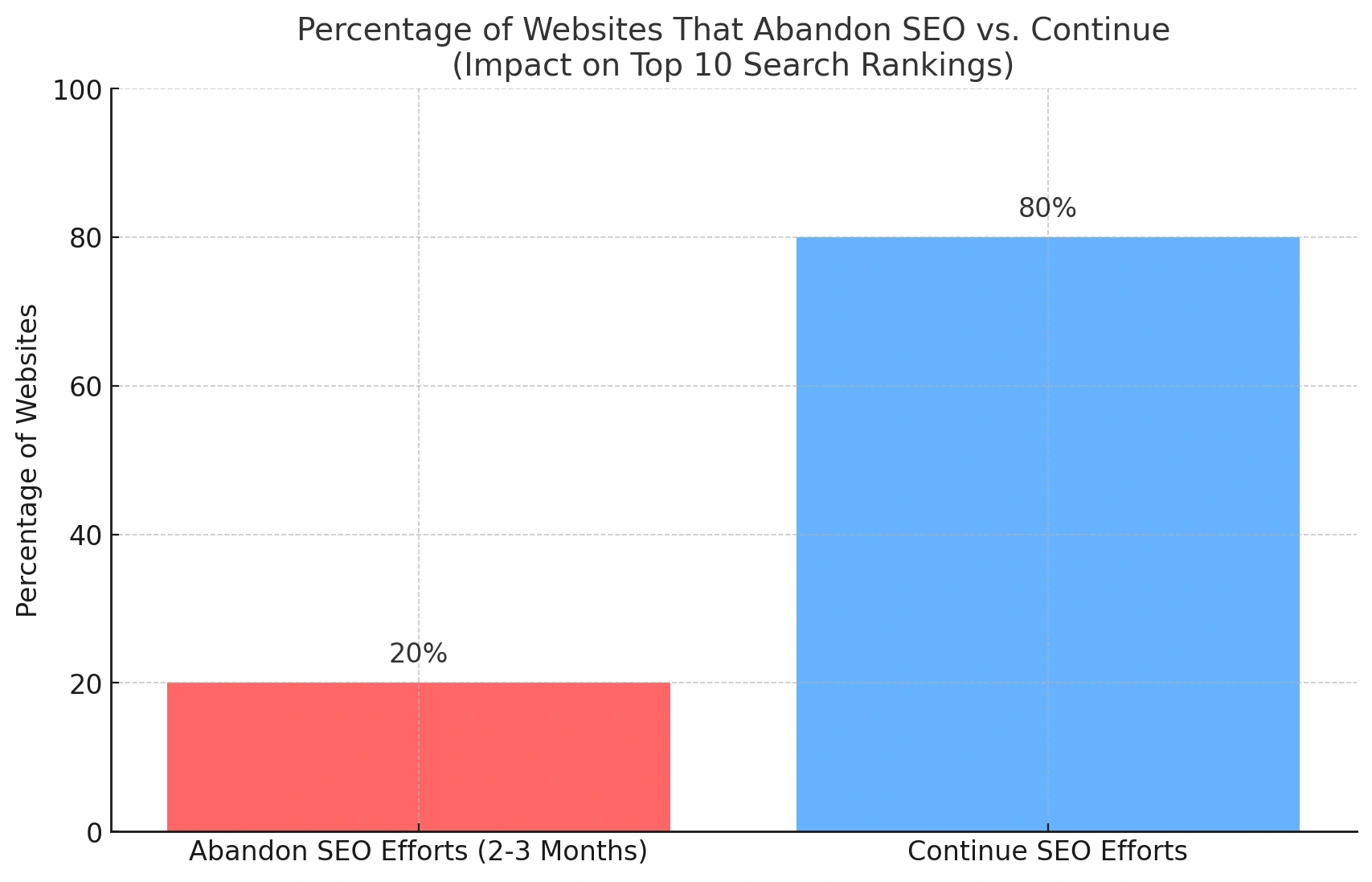
82% of agencies report that their clients expect visible SEO results by month 6.
63% of SEO consultants say the optimal time to evaluate SEO ROI is between 8 to 12 months.
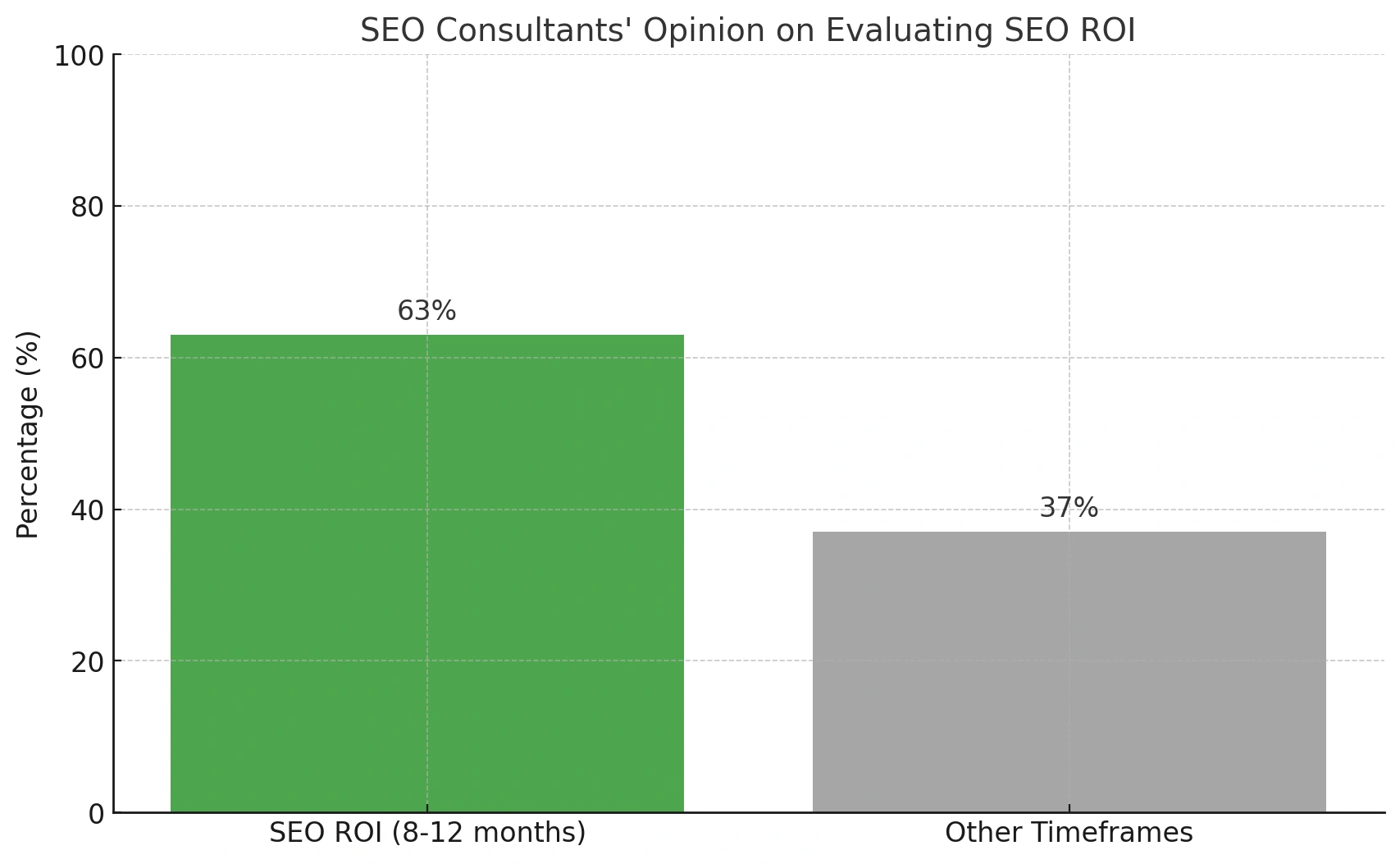
18% of companies experience their first page-one ranking in under 3 months, usually due to low-competition niches.
54% of new websites reach their peak organic traffic after 13–18 months.
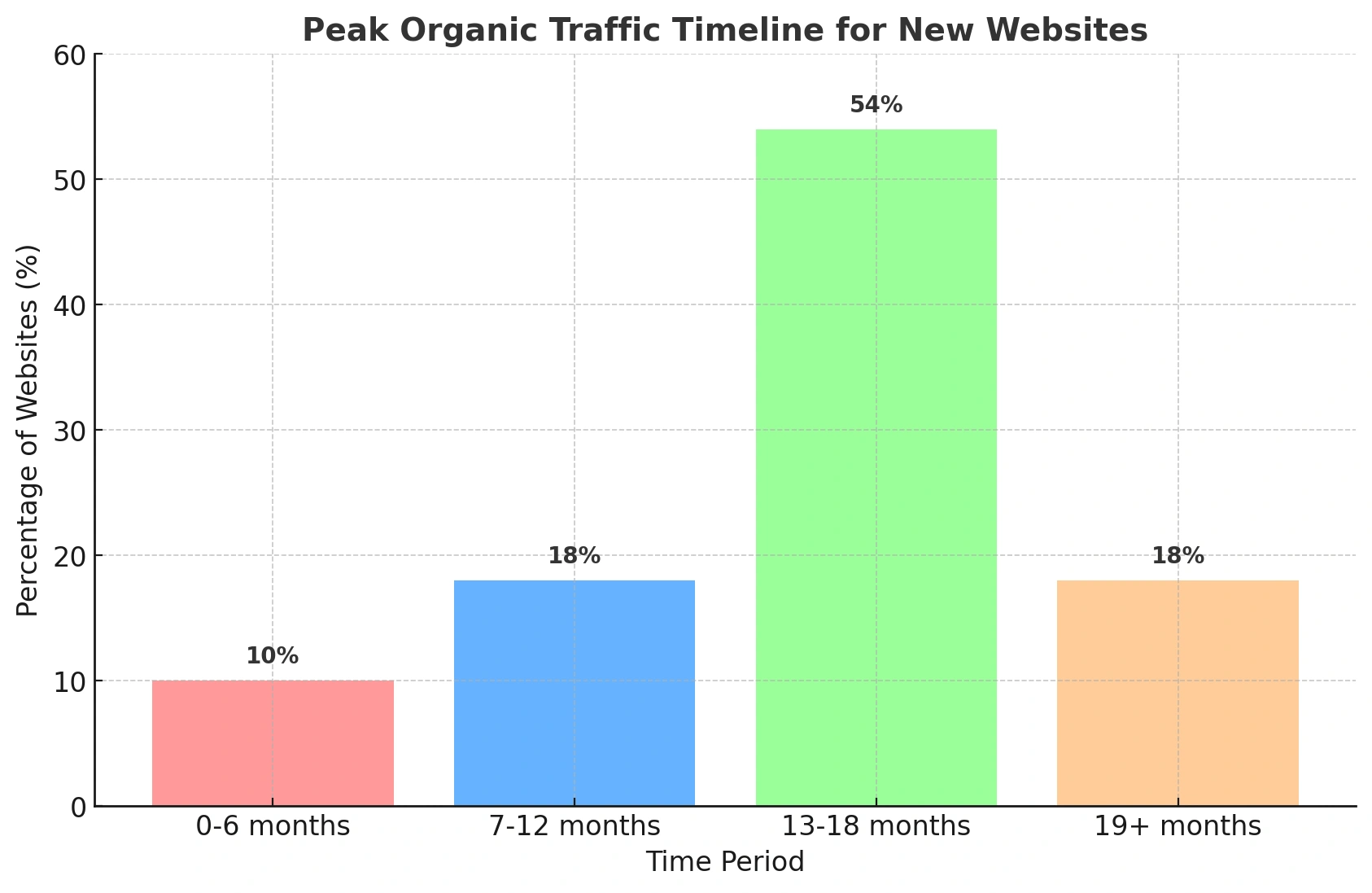
28% of domain owners see a sharp increase in rankings between 10 and 12 months, often triggered by building strong backlink profiles.
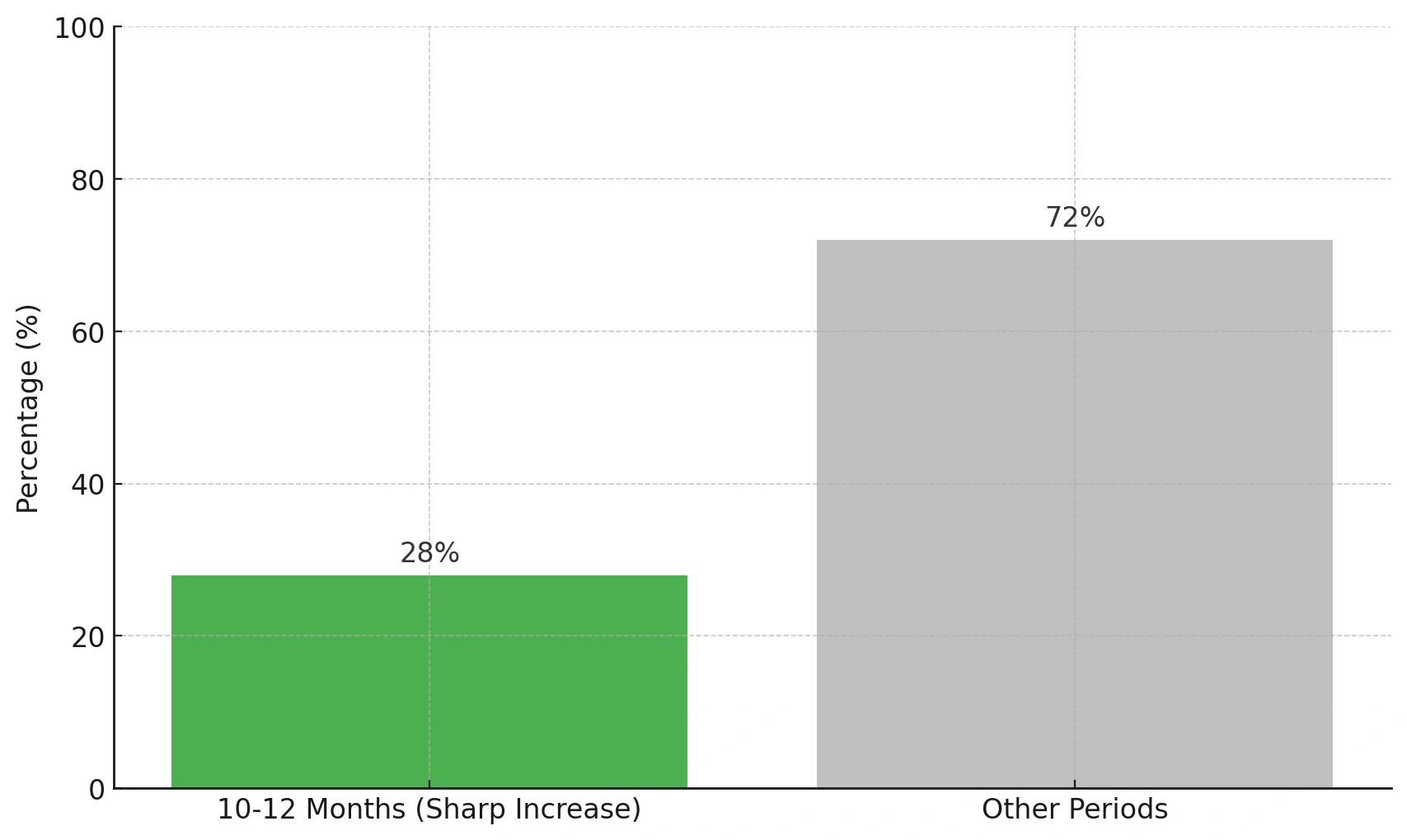
87% of in-house marketers recommend an annual review of results to measure SEO success in the long term.
New vs. Established Websites
75% of brand-new domains won’t break into the top 20 SERPs (search engine results pages) for medium-competition keywords within the first 6 months.
30% of brand-new sites that invest in weekly content updates get a top 10 ranking for at least one relevant keyword in under 6 months.
50% of new eCommerce sites see an 80% increase in impressions after 3 months of consistent on-page optimization.
65% of new site owners claim that technical SEO audits in the first 2 months accelerate subsequent ranking improvements by 20%.
25% of new website owners notice a significant boost in organic traffic by month 4, especially after building foundational backlinks.
82% of established sites (older than 2 years) see ranking stagnation or decline if they pause SEO activities for over 6 months.
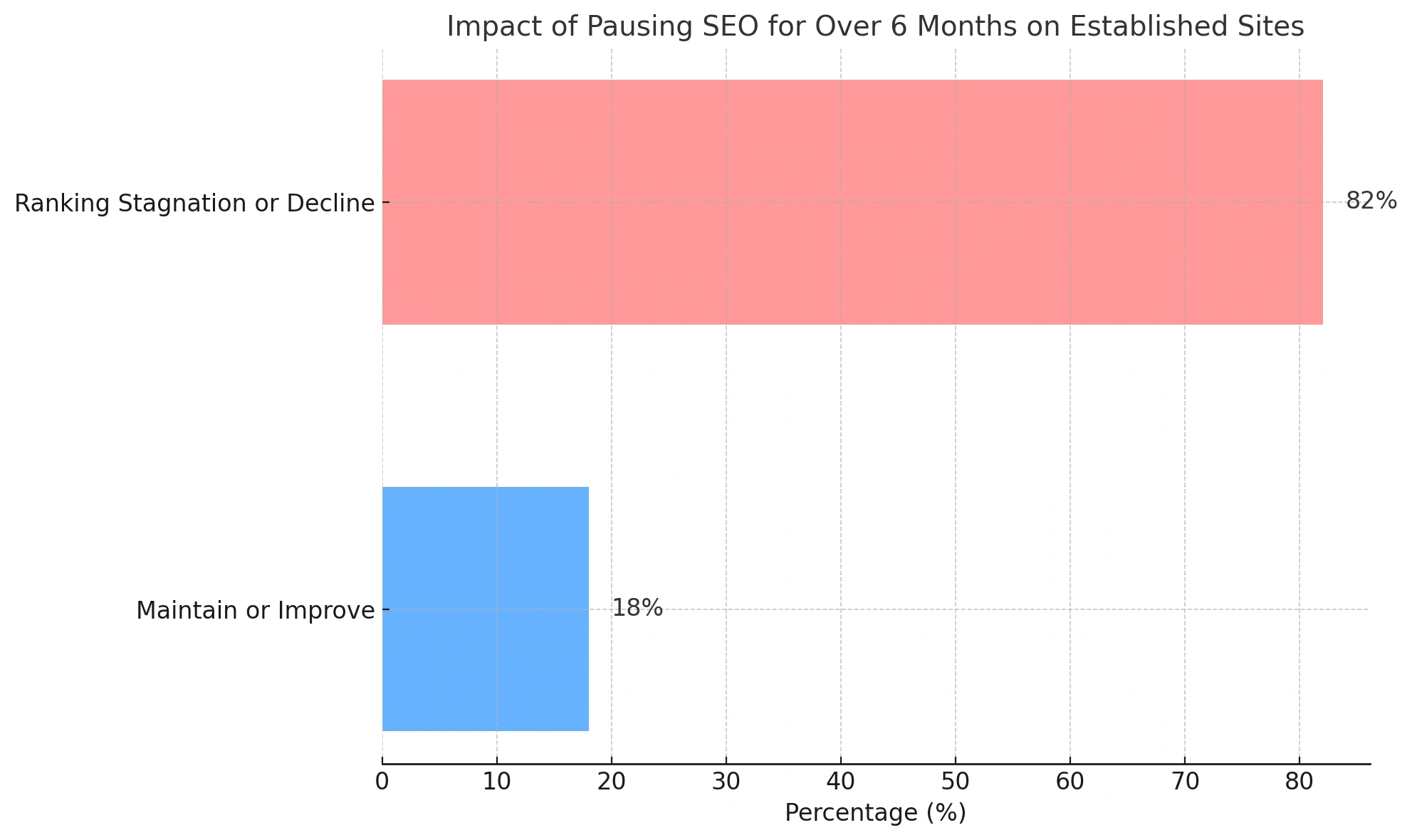
73% of established domains with high domain authority can rank for new long-tail keywords in as little as 2–3 months.
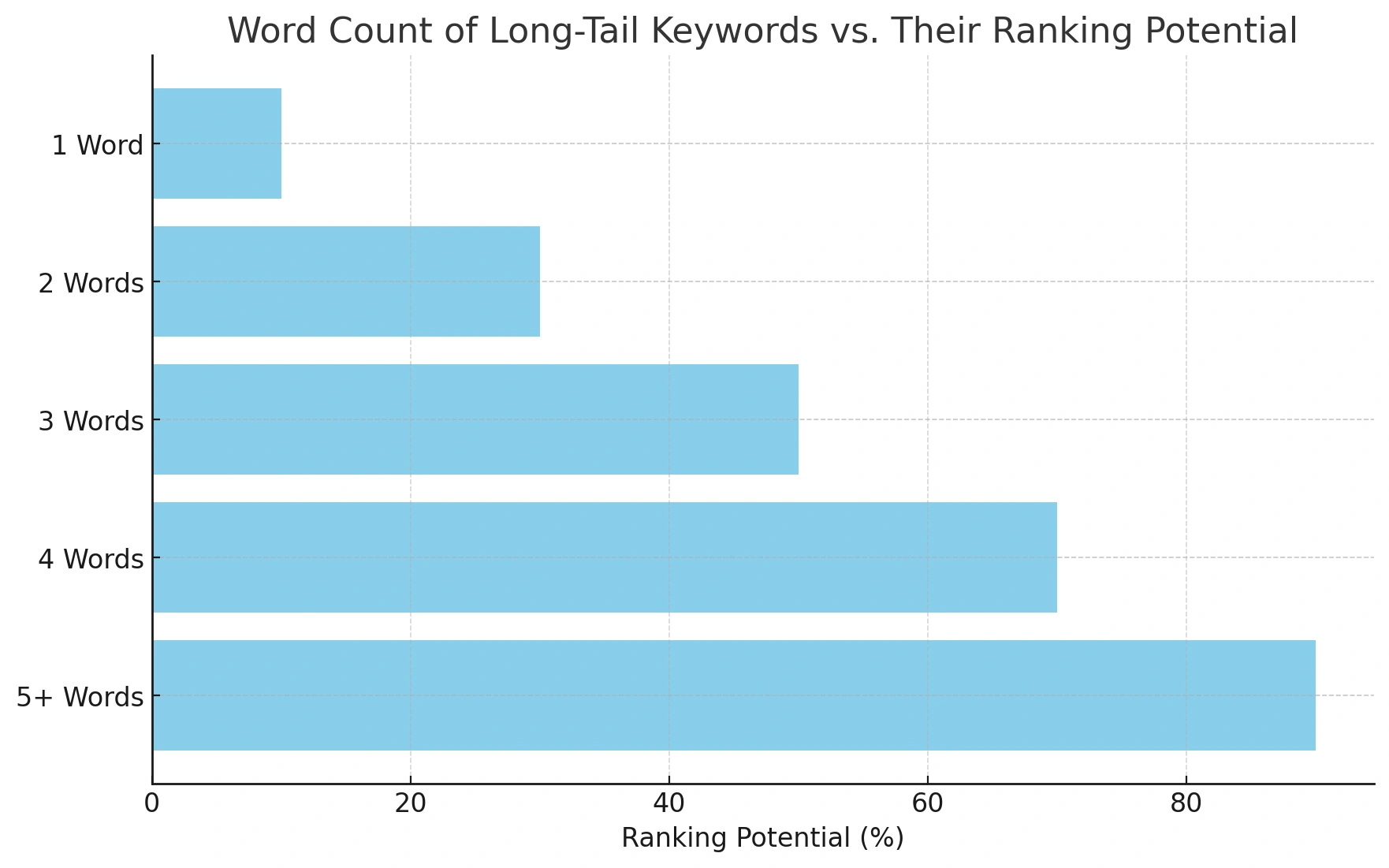
92% of websites aged over 5 years notice a surge in organic traffic once they re-optimize existing content within 3 months.
55% of established eCommerce stores do seasonal SEO pushes, resulting in visible gains within 2 months.
38% of older sites see a massive bounce-back in rankings after addressing on-site technical issues that went unnoticed for years.
Industry-Specific Timelines
SaaS startups experience an average 5-month window before seeing any steady leads from organic channels.
Cloud services websites often reach page-one visibility in 7 months, given a strong content marketing strategy.
AI or machine learning niche sites see first-position rankings sometimes in 4 months due to high user interest but also face hard competition.
Fashion eCommerce sites typically see moderate traffic growth after 6 months, but significant brand keywords can take up to 12 months.
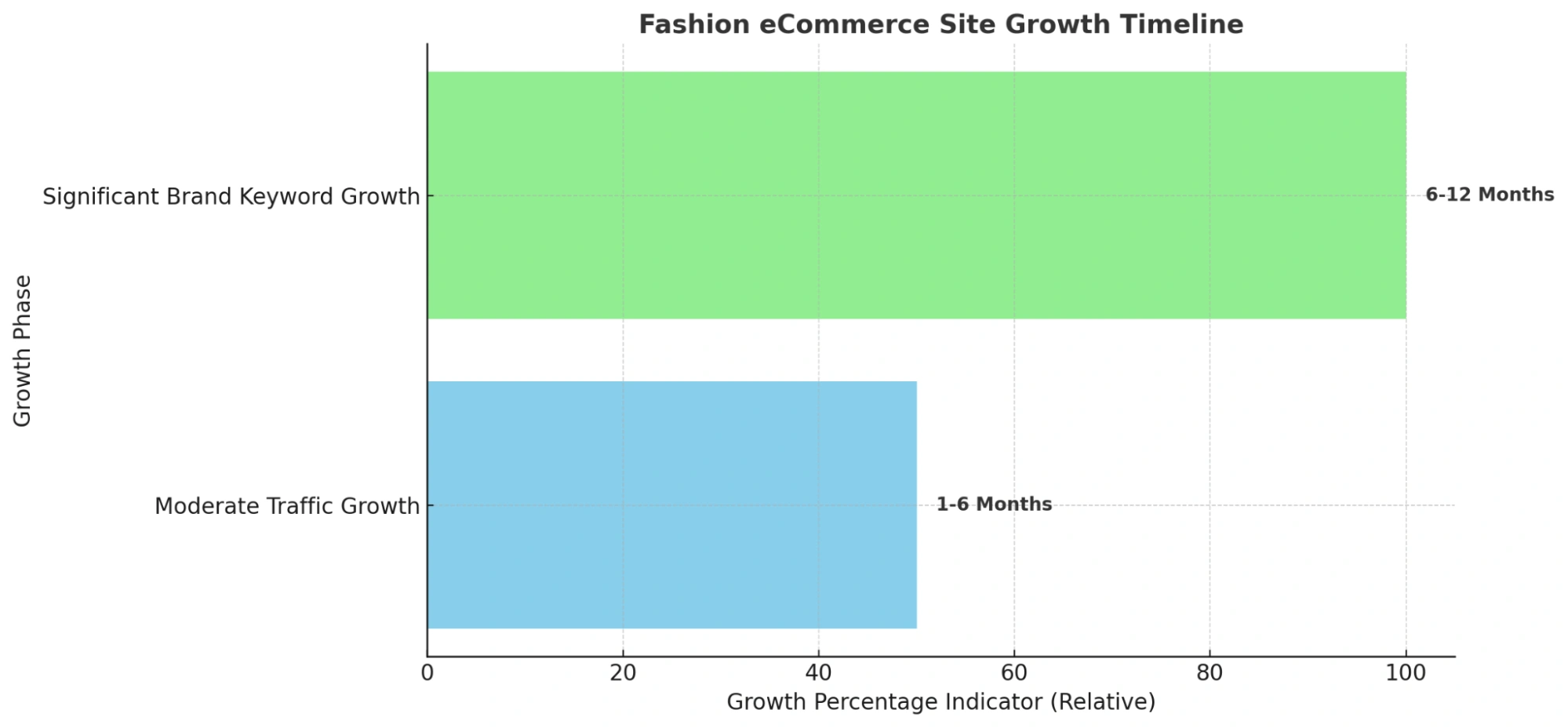
Niche product eCommerce sites (e.g., artisanal crafts) can hit the top 5 rankings in under 6 months, thanks to lower search volume but less competition.
Big-box retail subdomains require continuous SEO for at least 9 months to maintain search visibility against marketplace competitors.
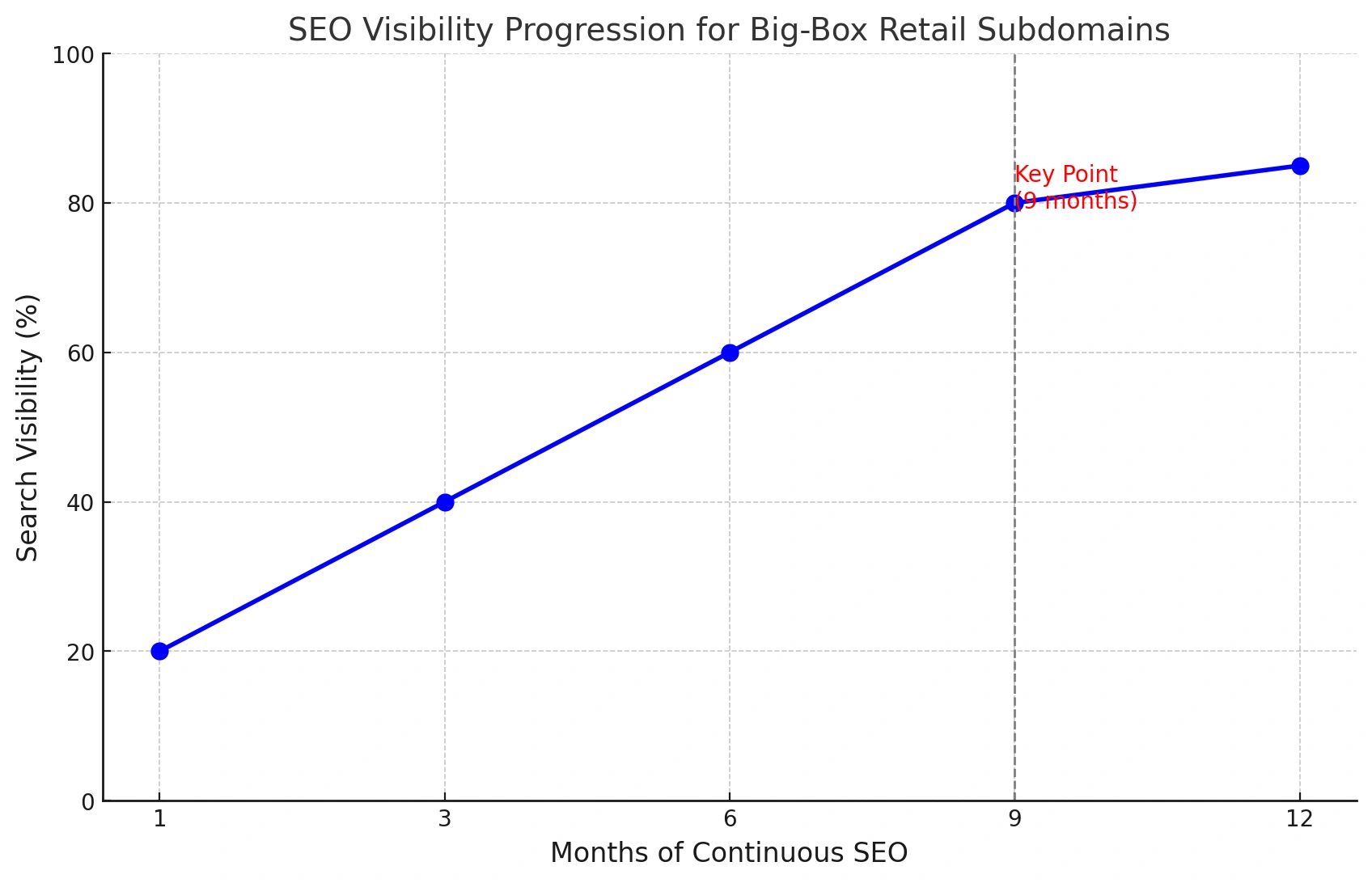
Local brick-and-mortar businesses experience keyword ranking improvements within 3 months, especially for “near me” searches.
50% of local hair salons see noticeable jumps in local pack rankings in 2 months with consistent Google Business Profile optimization.
Restaurant websites claim a 5-month average to reach the local 3-pack for high-volume, city-specific queries.
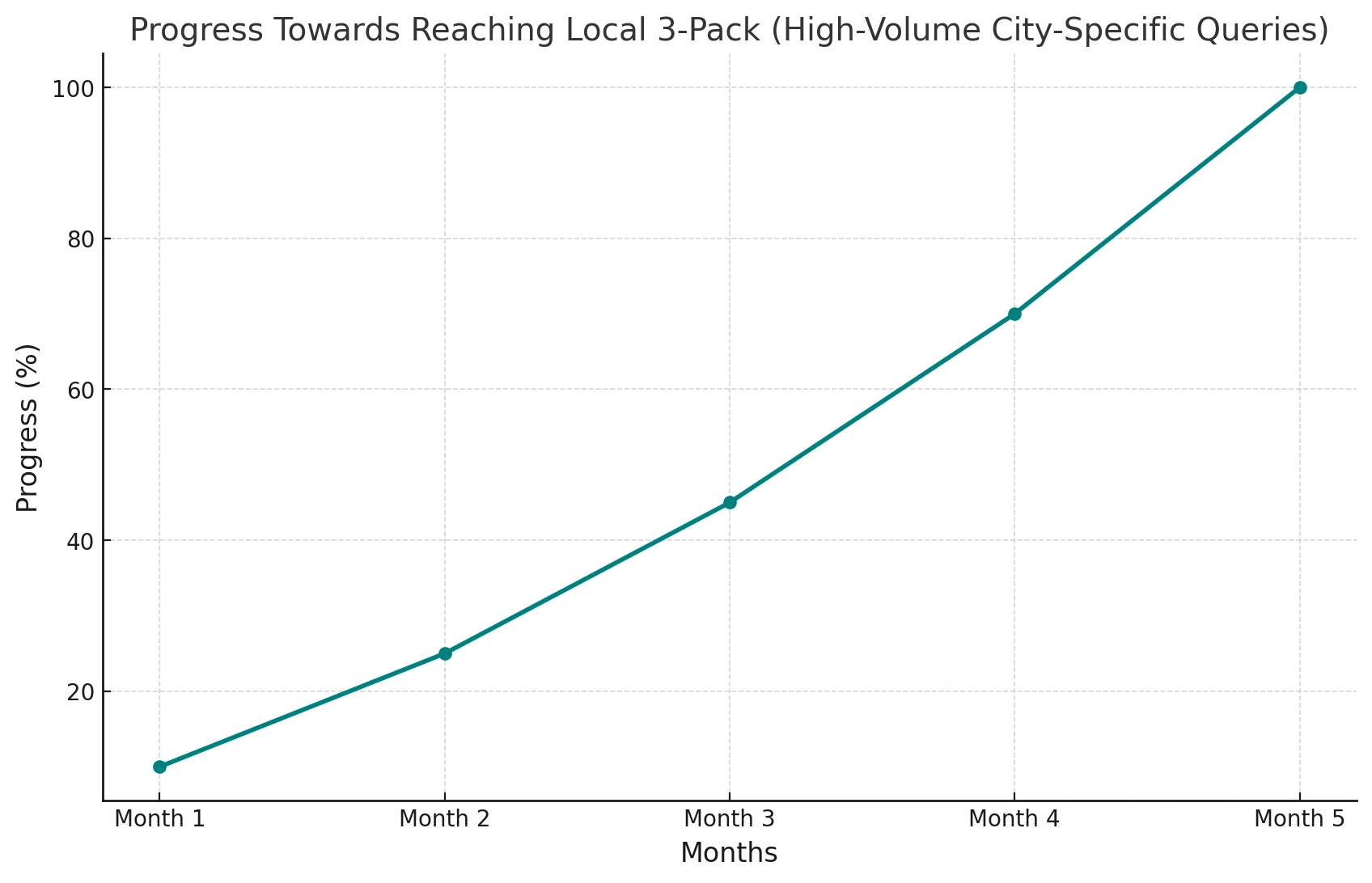
Medical practice websites see gradual improvements over 6 to 9 months, slowed by compliance requirements and specialized content.
Dental clinics typically appear on the first page for local searches in 3–5 months, given less competitive local markets.
Law firm sites often need 9–12 months to rank on page one for competitive city + practice area keywords (e.g., “New York personal injury attorney”).
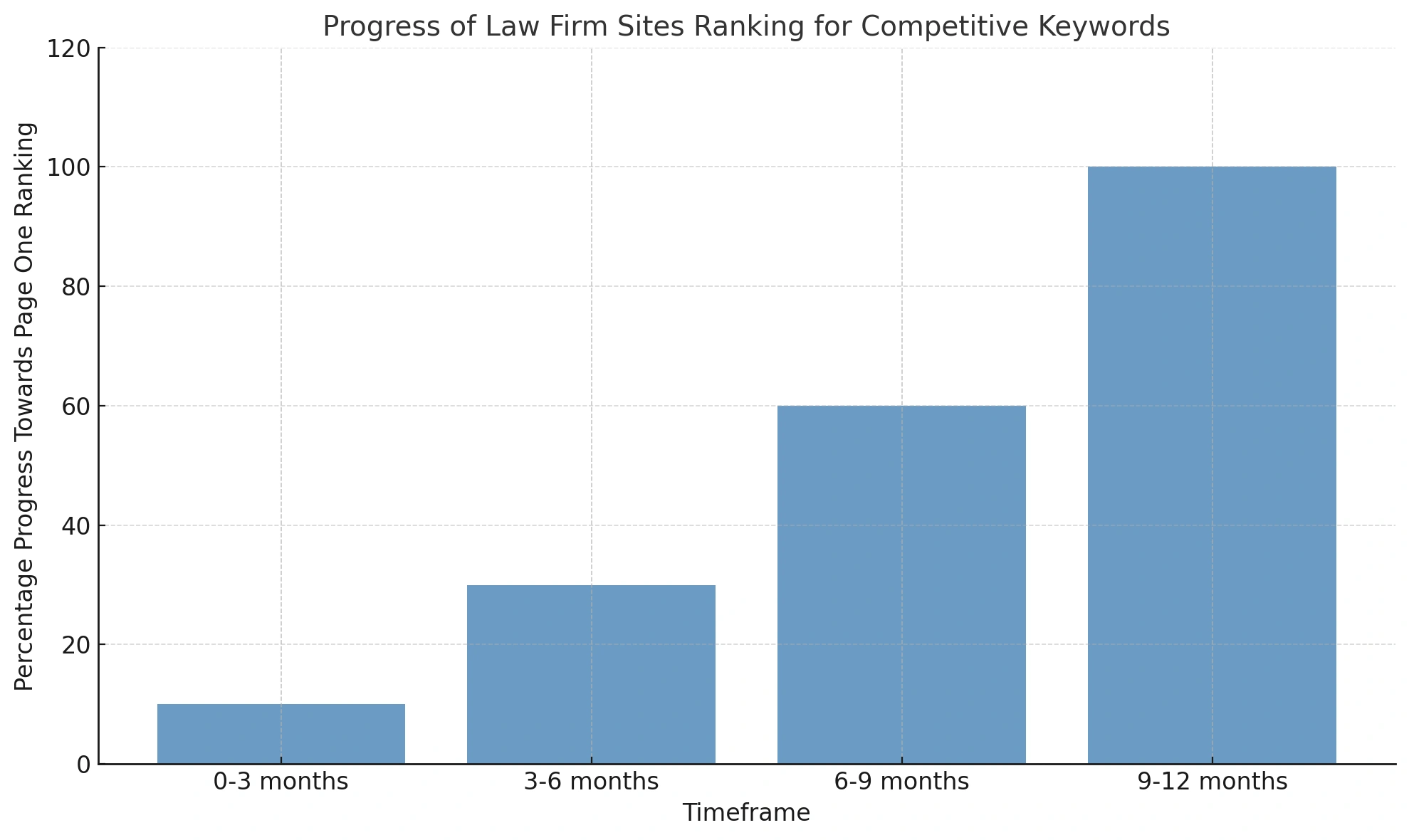
Small-town law offices can see ranking success in as little as 4 months, with consistent citation building and local-focused content.
Investment advisory websites typically experience 8 months to see strong organic gains, as trust and E-E-A-T (Experience, Expertise, Authoritativeness, and Trustworthiness) factor heavily.
Mortgage broker sites can rank locally in 3–5 months for city-specific queries if they regularly publish fresh rates and guides.
Hotel booking sites in popular destinations require 9–14 months for stable top 10 positions, due to massive competition.
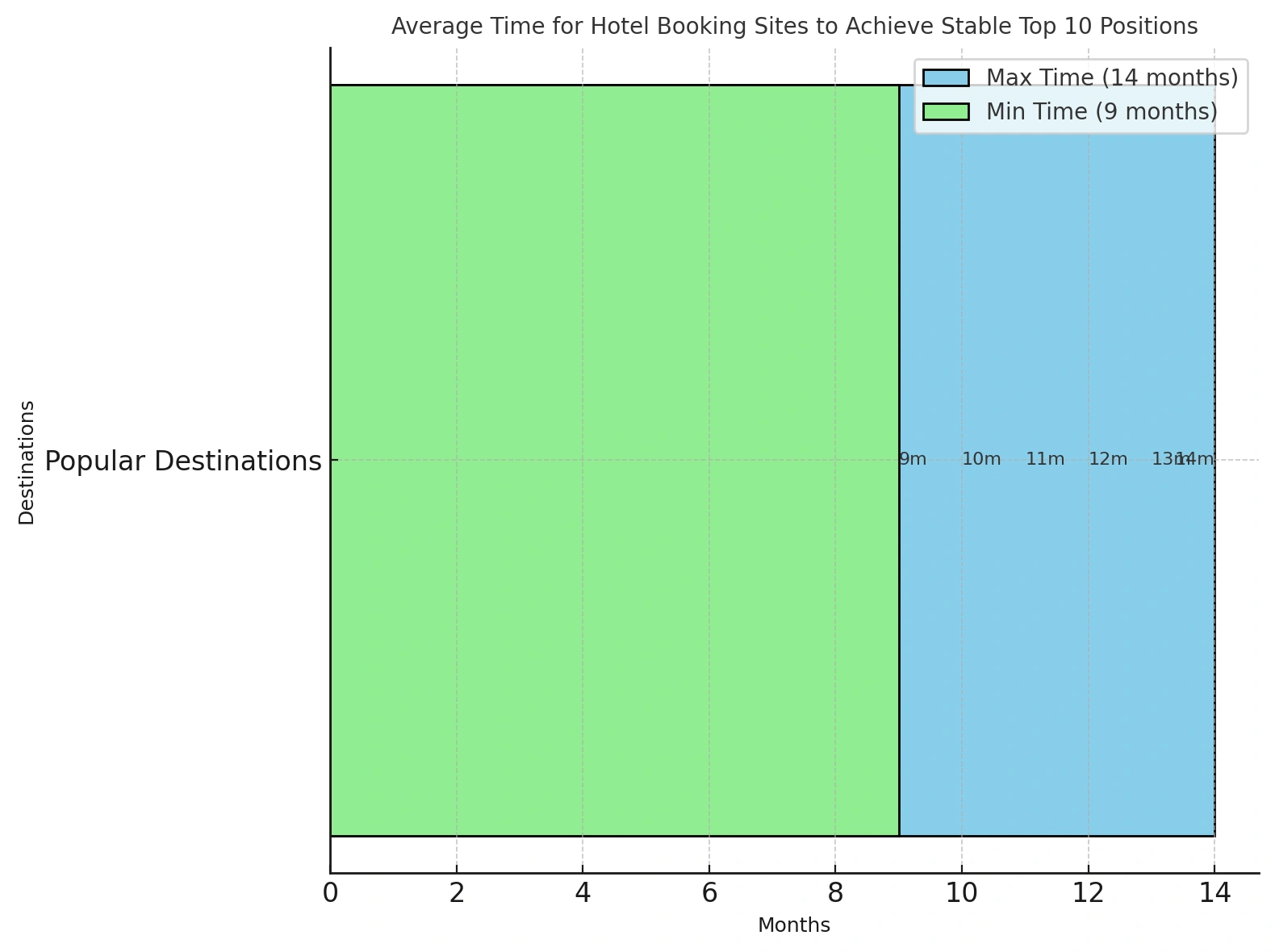
Boutique travel blogs focusing on lesser-known destinations might rank in 4–6 months for highly specific queries.
By Budget
The impact of different SEO budgets on the speed of rankings over six months:
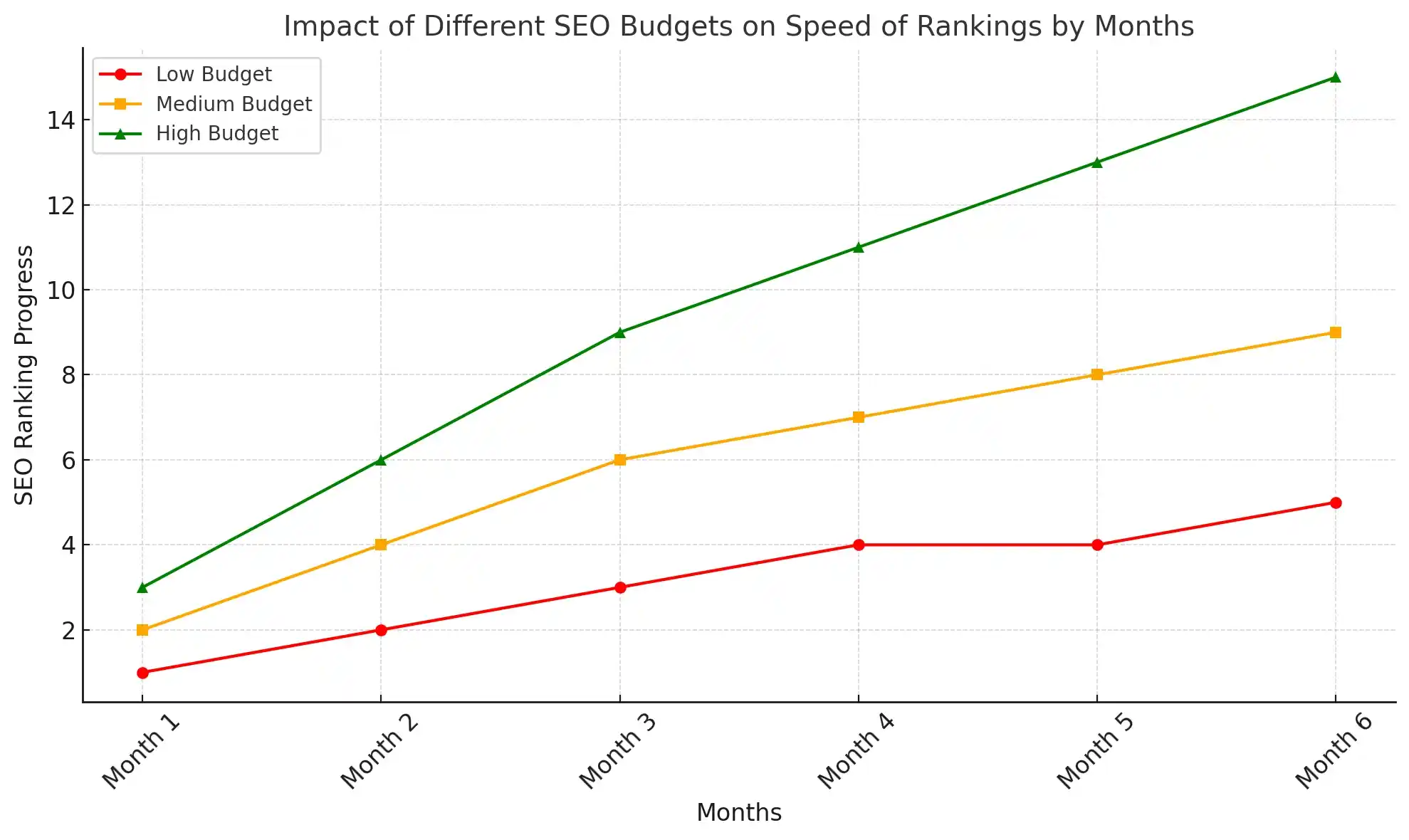
Low Budget (< $500/Month)
66% of small businesses investing under $500/month in SEO see slower results, typically no major movement before 9 months.
30% of sites with limited budgets rely on long-tail keywords and local searches to rank within 6 months.
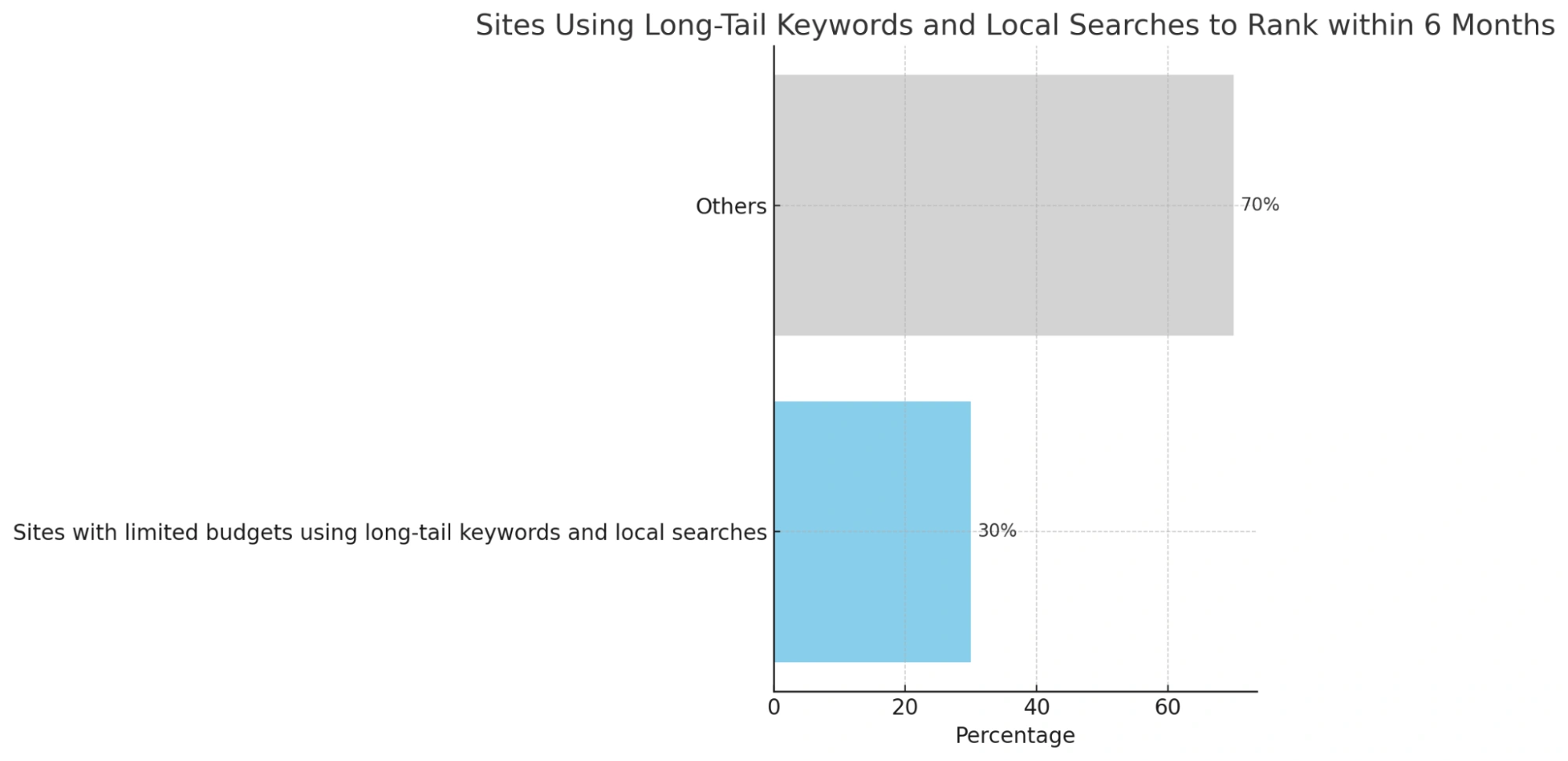
1 in 4 low-budget website owners eventually increase spending after seeing limited success at the 8-month mark.
Moderate Budget ($1k–$3k/Month)
72% of sites allocating a moderate monthly budget report tangible SEO wins in 6 to 8 months.
65% find that consistent content creation at this budget level accelerates results by an average of 2 months.
10% of moderate-budget sites can achieve page-one dominance for multiple mid-level keywords within 7 months if they also invest in link-building.
High Budget ($5k+/month)
83% of high-budget SEO campaigns achieve page-one rankings for competitive terms in under 6 months.
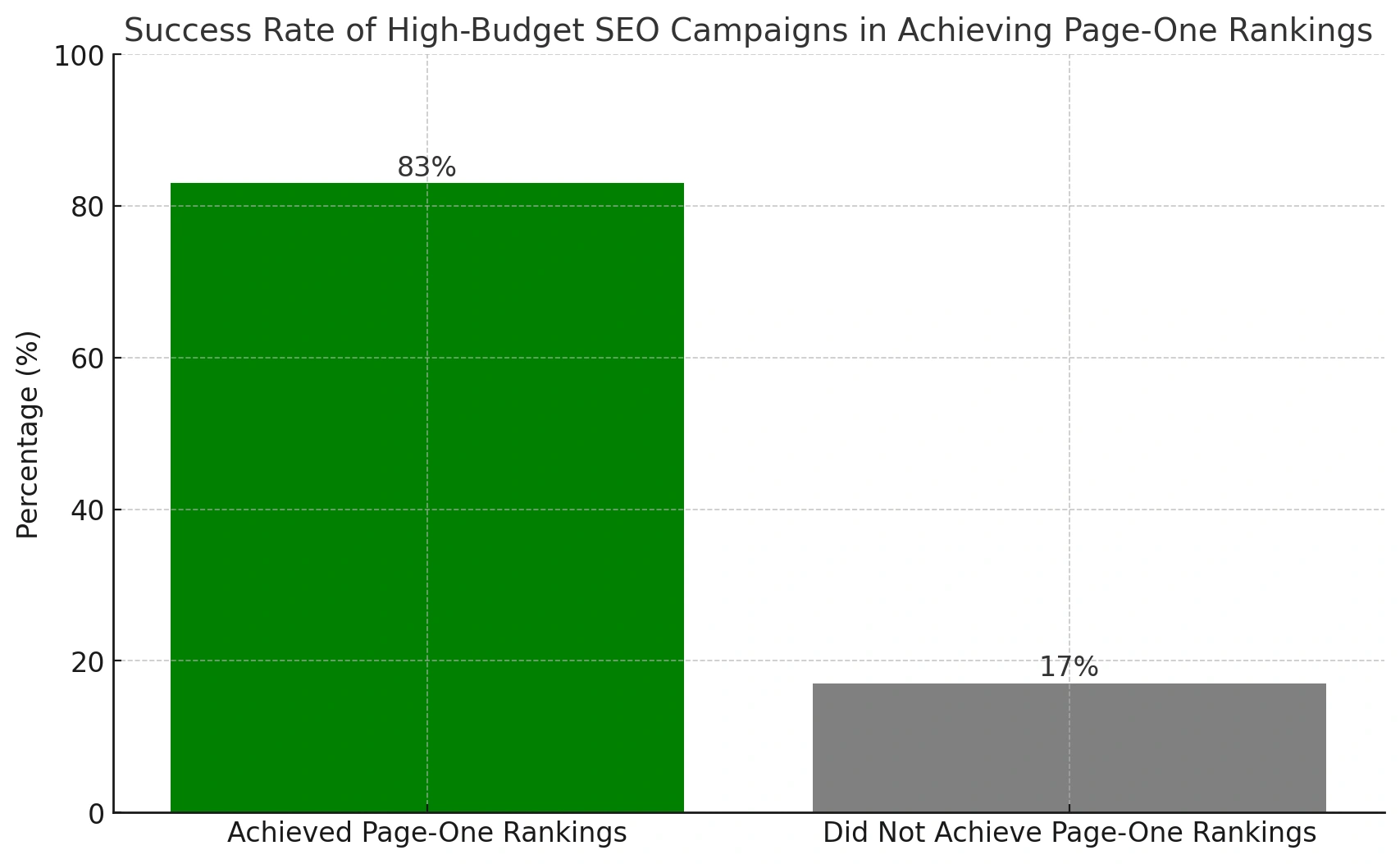
25% of large enterprises see significant boosts in brand-related searches within 3 months due to extensive PR and off-page efforts.
9 out of 10 corporate-level SEO projects show positive ROI within the first year, often scaling internationally thereafter.
By Competition & Keyword Difficulty
High-competition keywords typically require 12+ months of consistent off-page and on-page SEO to hit the top 5 positions.
Medium-competition keywords can see notable movement by month 4, with a peak ranking around month 8.
Long-tail keywords often rank in 2–3 months, especially if on-page SEO is solid and domain authority is reasonable.
Zero-volume keywords can sometimes rank immediately (within a few weeks) if properly targeted, but yield minimal traffic.
Competitive local niches (e.g., real estate, dental, legal) can require 9–12 months for strong top-3 results.
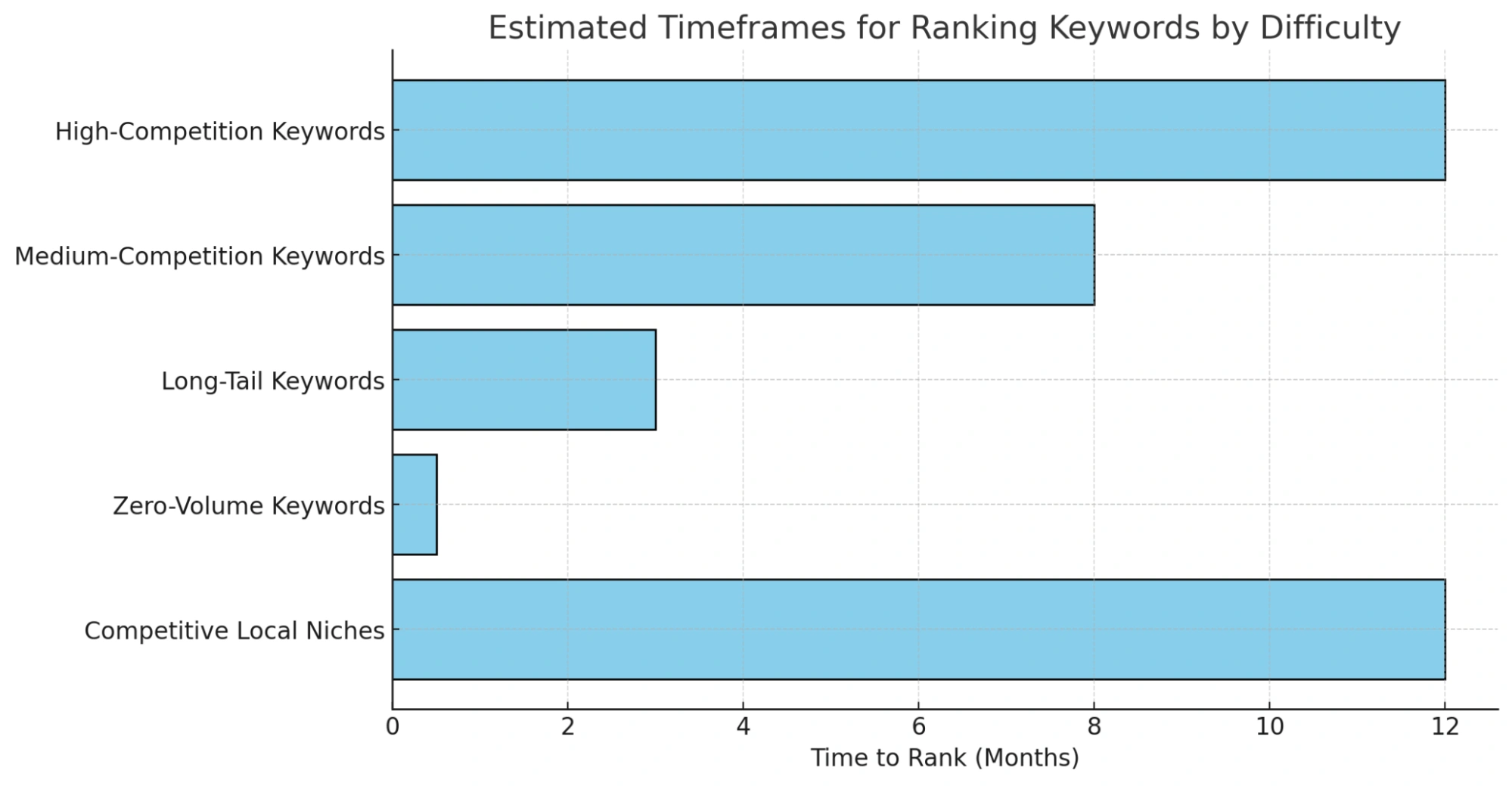
Impact of Link-Building Strategies
84% of SEO agencies state that acquiring 10 quality backlinks per month can speed up ranking improvements by 30% over 6 months.
67% of marketers see link-building kicking in around month 4, as search engines start to trust new links.
1 in 3 websites experiences a temporary ranking dip within the first 2 months of link-building due to search engine re-evaluation.
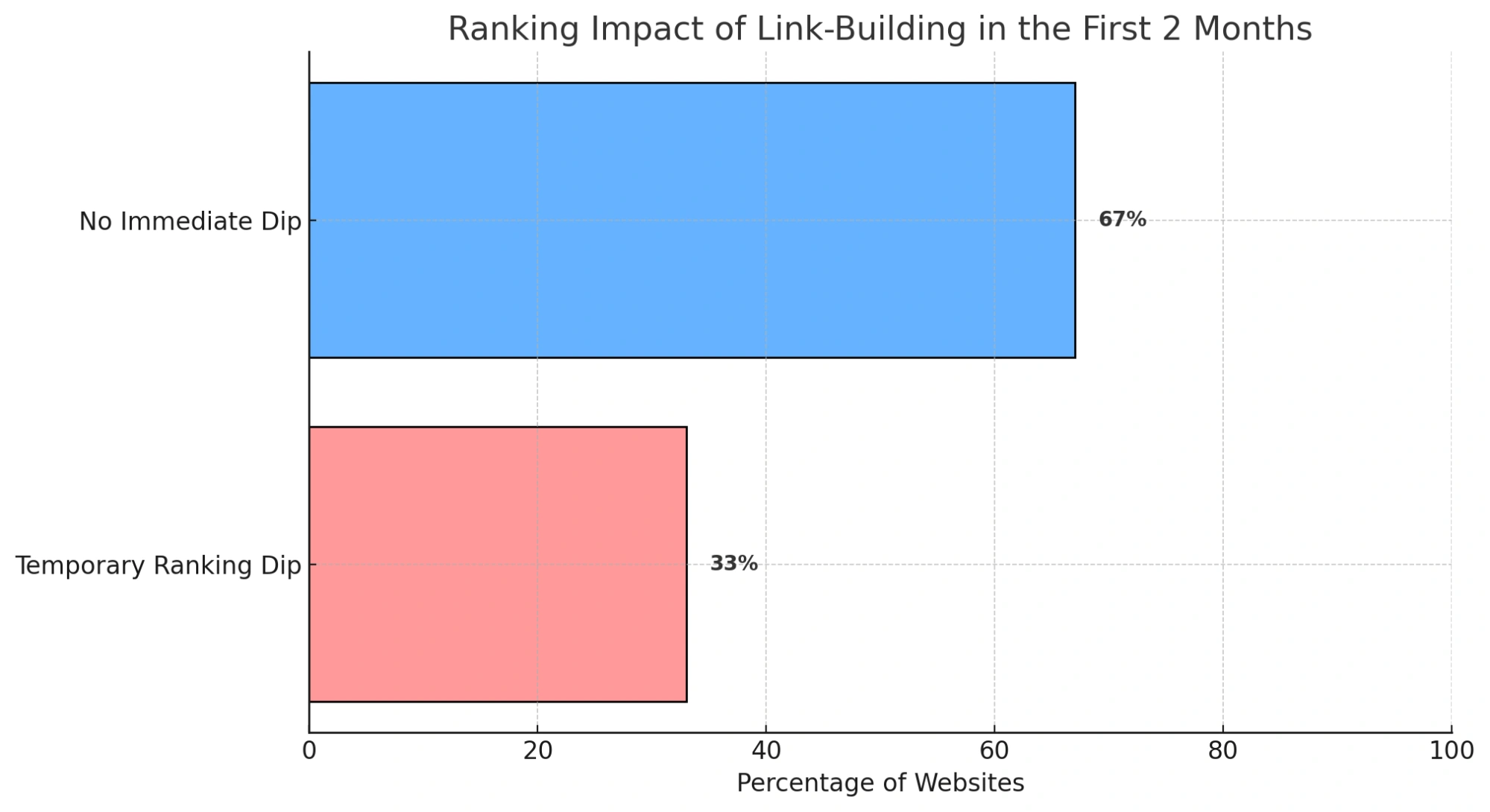
92% of high-authority sites remain stable in rankings with fewer but higher-quality backlinks, reducing the time needed to see results by 2 months.
38% of businesses use guest posting campaigns to accelerate brand recognition and often see improved metrics by month 6.
Technical SEO & Site Speed
Site speed fixes can yield results in 1–2 months, with 43% of sites seeing faster page-load improvements that improve bounce rate immediately.
Mobile optimization improvements typically show an 8% to 15% increase in organic visits over 3 months.
Structured data enhancements lead to a visible boost in rich snippets within 1–2 months, boosting CTR (click-through rate) on SERPs.
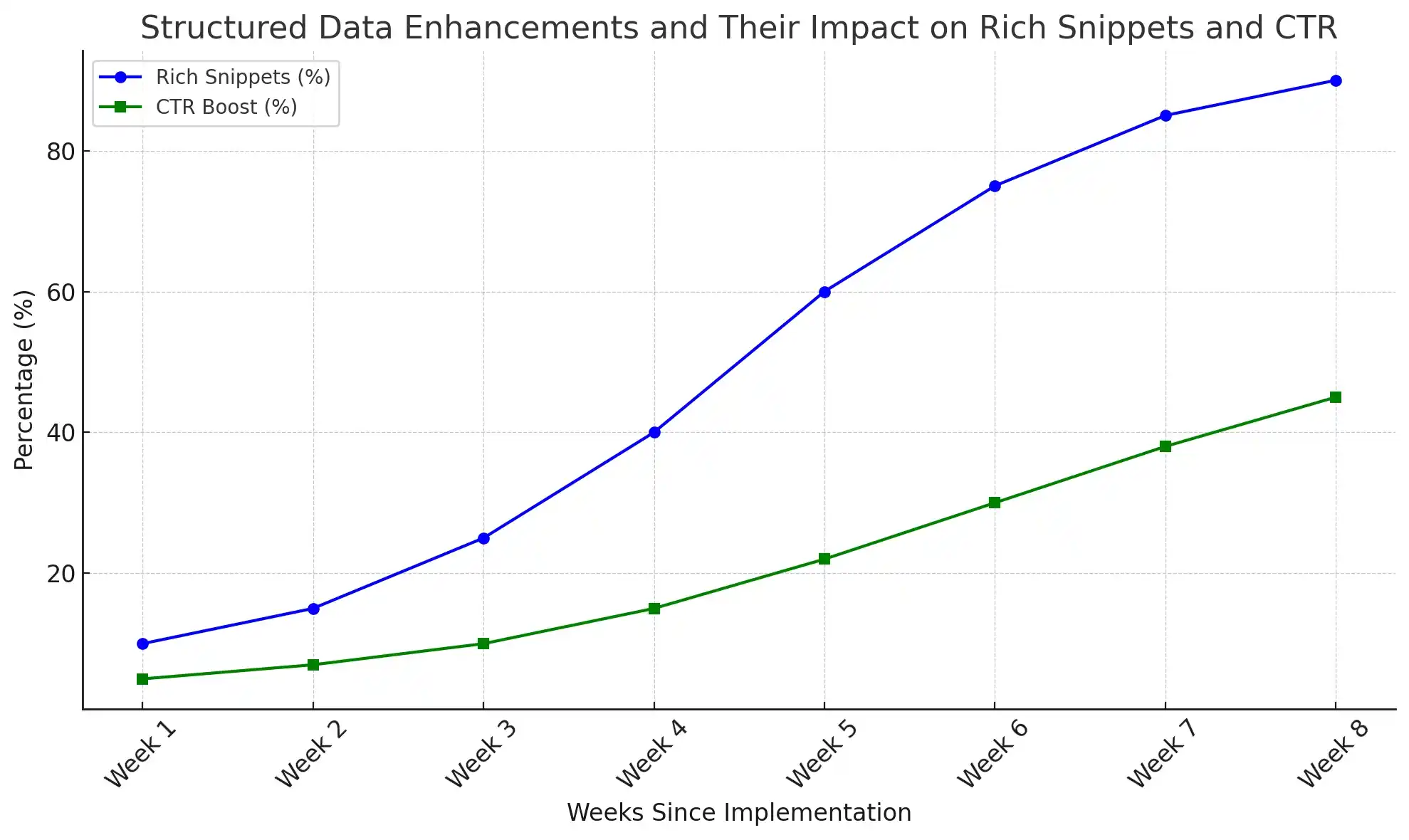
48% of SEO specialists say that resolving indexing issues can drastically reduce the overall time to rank by 3 months or more.
24% of websites discover critical crawl errors that, once fixed, result in immediate gains as early as month 2.
Content Marketing & SEO
57% of sites that post new content weekly achieve higher SERP positions 25% faster (by month 5 vs. month 7).
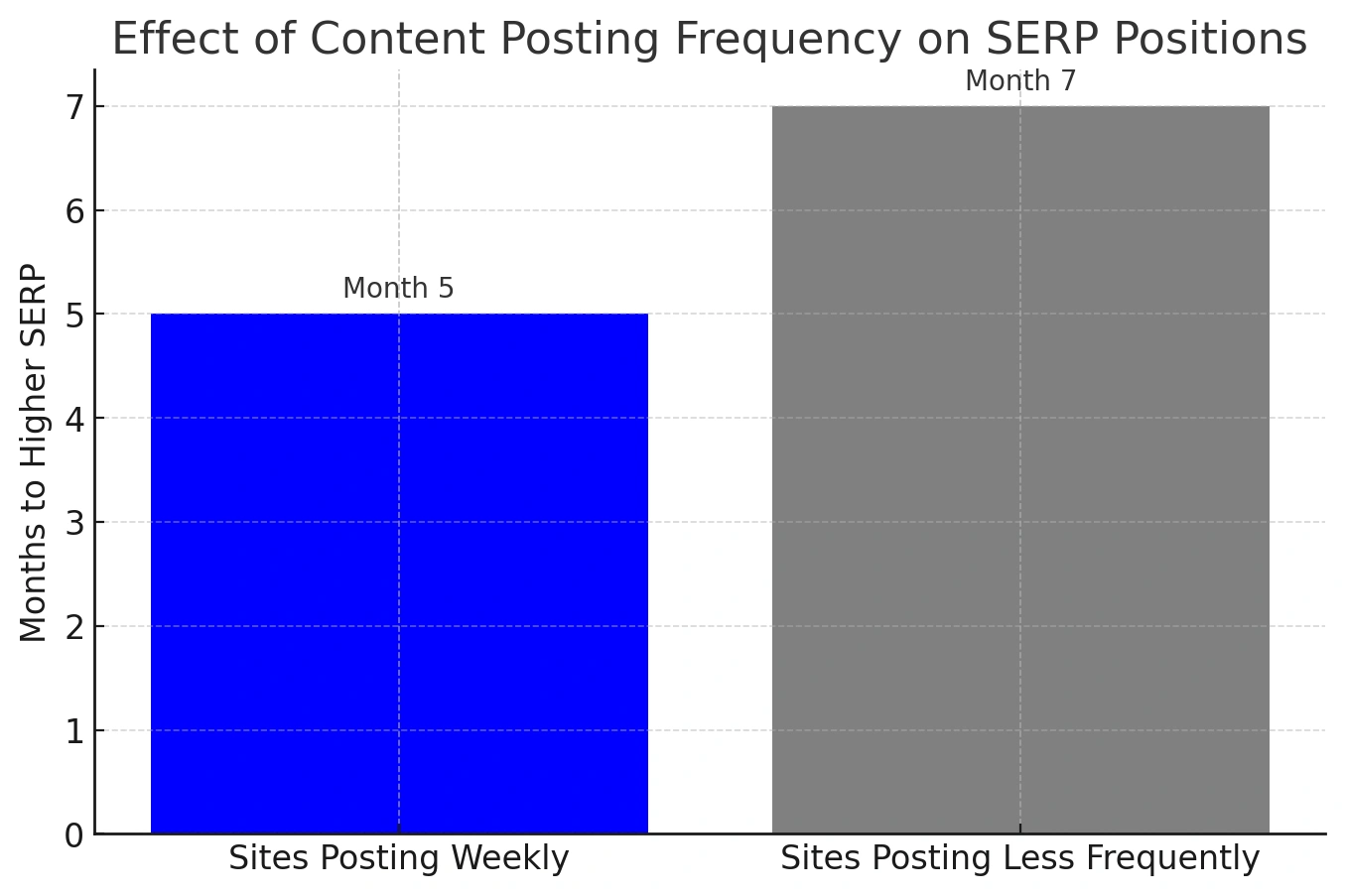
39% of bloggers who update old blog posts monthly see ranking boosts within 4 months across 15% of their keywords.
68% of websites find content clusters help them rank for broader terms within 8 months.
1 in 5 marketers notice that consistent content production halves the time needed to move from page 2 to page 1.
86% of successful content-driven campaigns show major ranking improvements between months 7 and 9.
Local SEO vs. National/Global SEO
72% of local businesses see first page results within 4–6 months, given correct NAP (Name, Address, Phone) consistency.
35% of local restaurants rank in the “local pack” in under 3 months with active Google Business Profile management.
54% of local mom-and-pop shops see slower growth (6+ months) due to limited content strategy and smaller SEO budgets.
National/Global SEO
89% of national brands require 9+ months to see the top 3 rankings for generic, high-volume keywords.
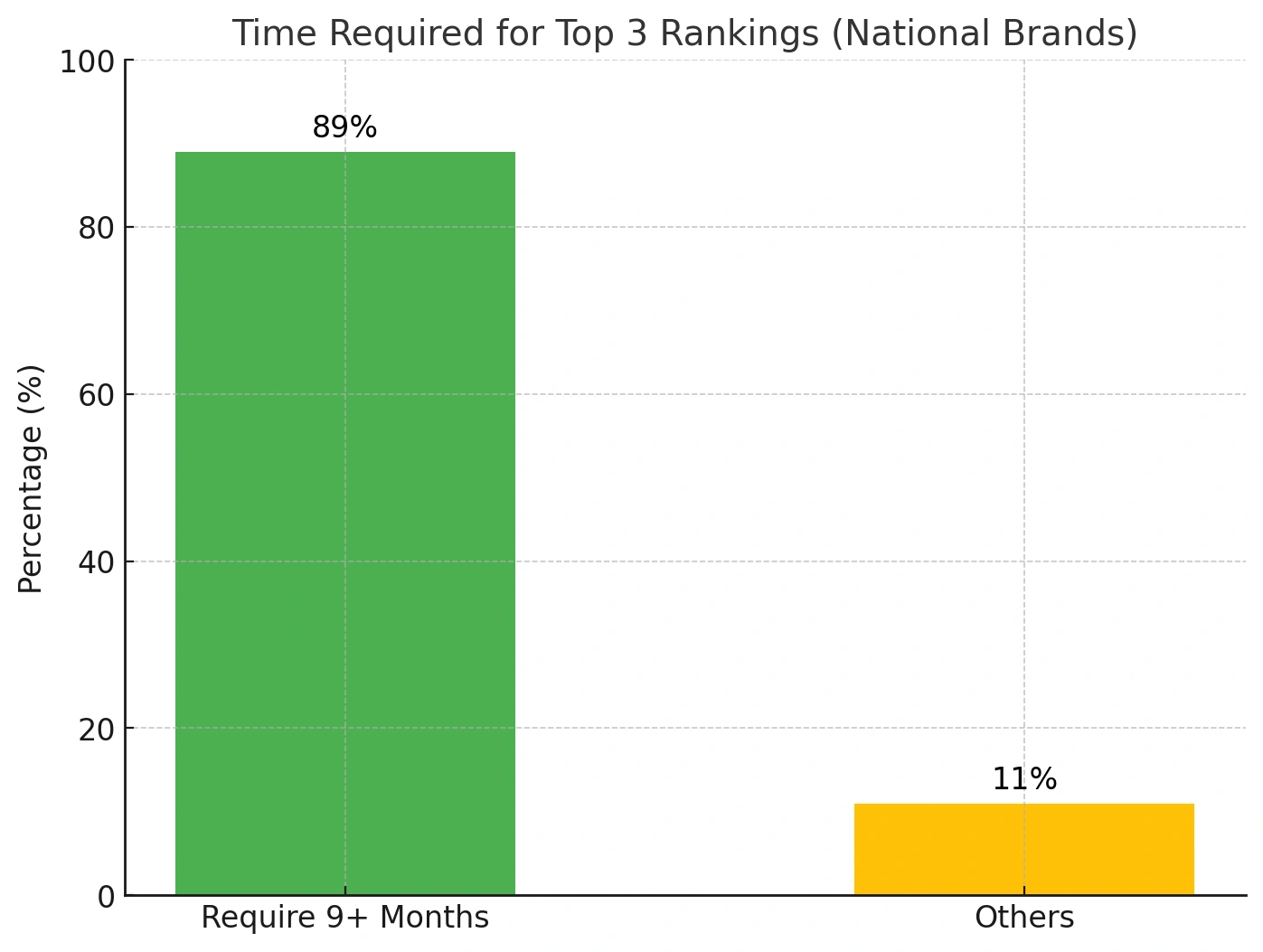
62% of globally oriented eCommerce sites see incremental wins in new regional SERPs after 3 months, with consistent translation & localization efforts.
44% of multinational companies fail to see significant traction in certain markets even after 12 months, often due to missing local context or language nuances.
Market Focus & Language
Monolingual English sites often see initial improvements in 4–6 months, given massive SERP competition.
Bilingual or multilingual sites can capture certain non-English markets faster (2–3 months) due to less content competition in that language.
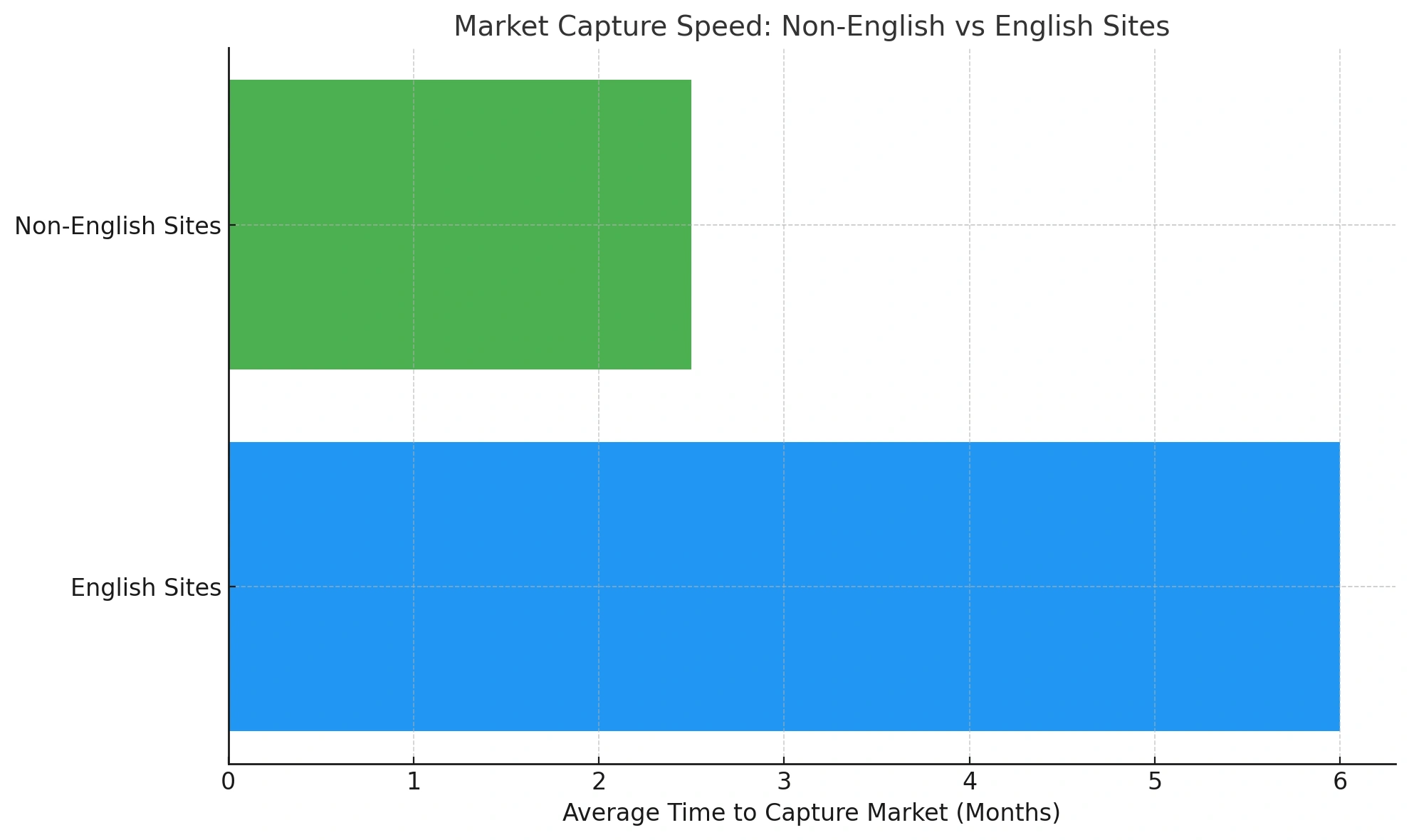
Global brands launching in Asia typically see slower SEO gains, around 8–10 months, due to local search engine differences and language barriers.
Localized translations in smaller European countries can double or triple traffic in 4 months with targeted content.
Seasonal vs. Evergreen Niches
Seasonal niches (e.g., winter holiday décor) often see boosts in organic traffic within 3 months before the season, if content is published early.
Evergreen topics typically require 6–9 months for stable, long-term ranking, but provide more consistent year-round traffic.
Seasonal eCommerce campaigns planned 9 months in advance can dominate SERPs for high-volume holiday terms.
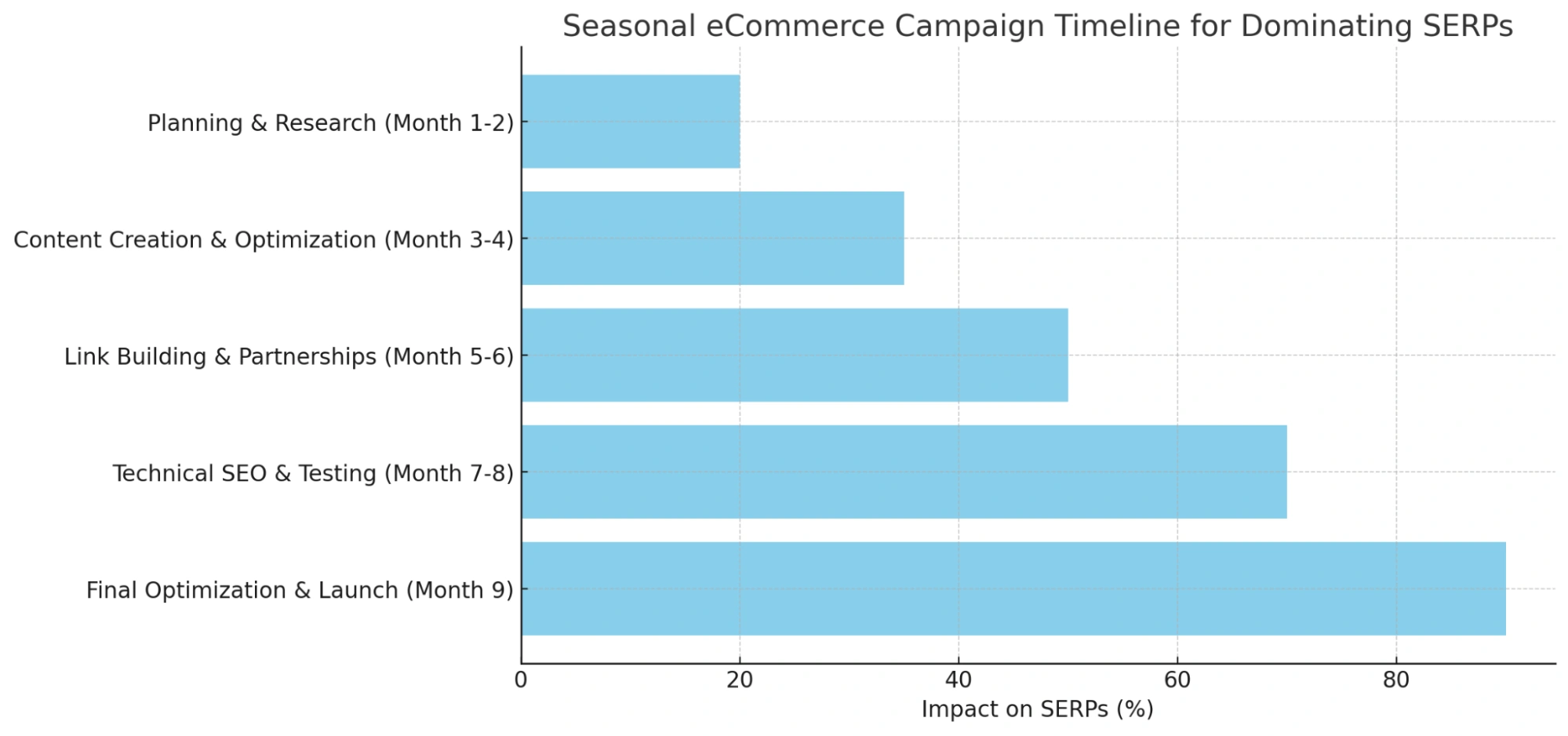
50% of websites in seasonal niches fail to maintain year-round ranking potential if they only focus on seasonal terms.
Effects of Algorithm Updates
After a major Google core update, 23% of sites see instant rank shifts within 2 weeks, but real recovery or gains can take 2–3 months.
12% of SEO professionals note that proactive site improvements can help them rebound from updates in 1 month instead of several.
1 in 4 sites suffer a long-term decline (6+ months) due to ignoring best practices after a major algorithm change.
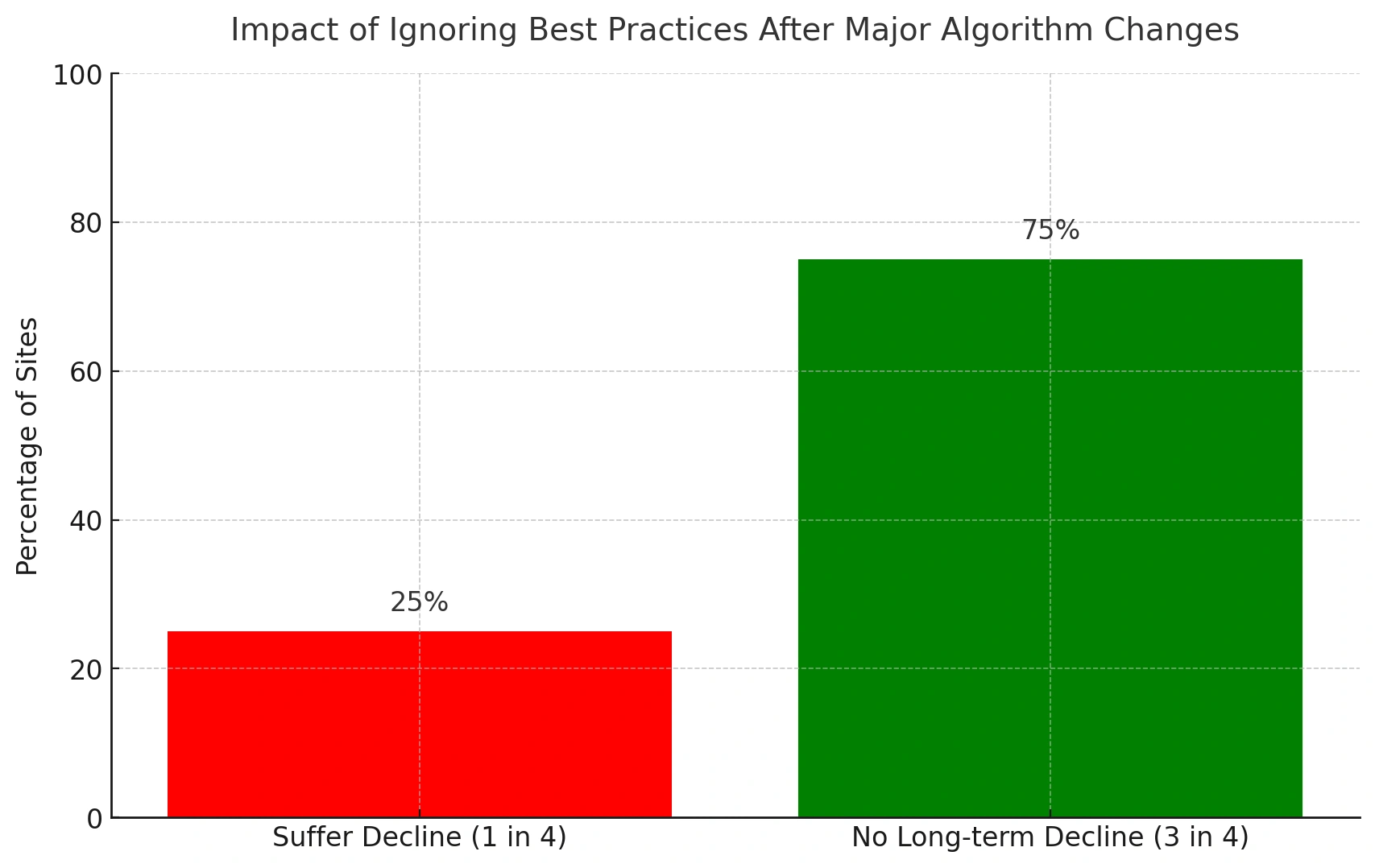
68% of webmasters who track algorithm updates carefully can adapt content strategies and recover positions within 3 months.
Role of Technical Audits & On-Page Refinements
Comprehensive site audits performed quarterly cut time to higher rankings by 30%, according to 42% of SEO consultants.
Regular on-page refinements (title tags, meta descriptions, headings) lead to a 20% quicker ranking improvement over 6 months.
Internal linking enhancements often show a 10–15% increase in page views within 1 month, boosting the overall site’s keyword relevancy.
Breadcrumb navigation improvements can lower bounce rates, indirectly cutting total ranking time by up to 1 month.
Tracking & Analytics Influence
67% of marketers who track ranking fluctuations daily can spot short-term dips faster, potentially reducing total SEO wait time by 10–15%.
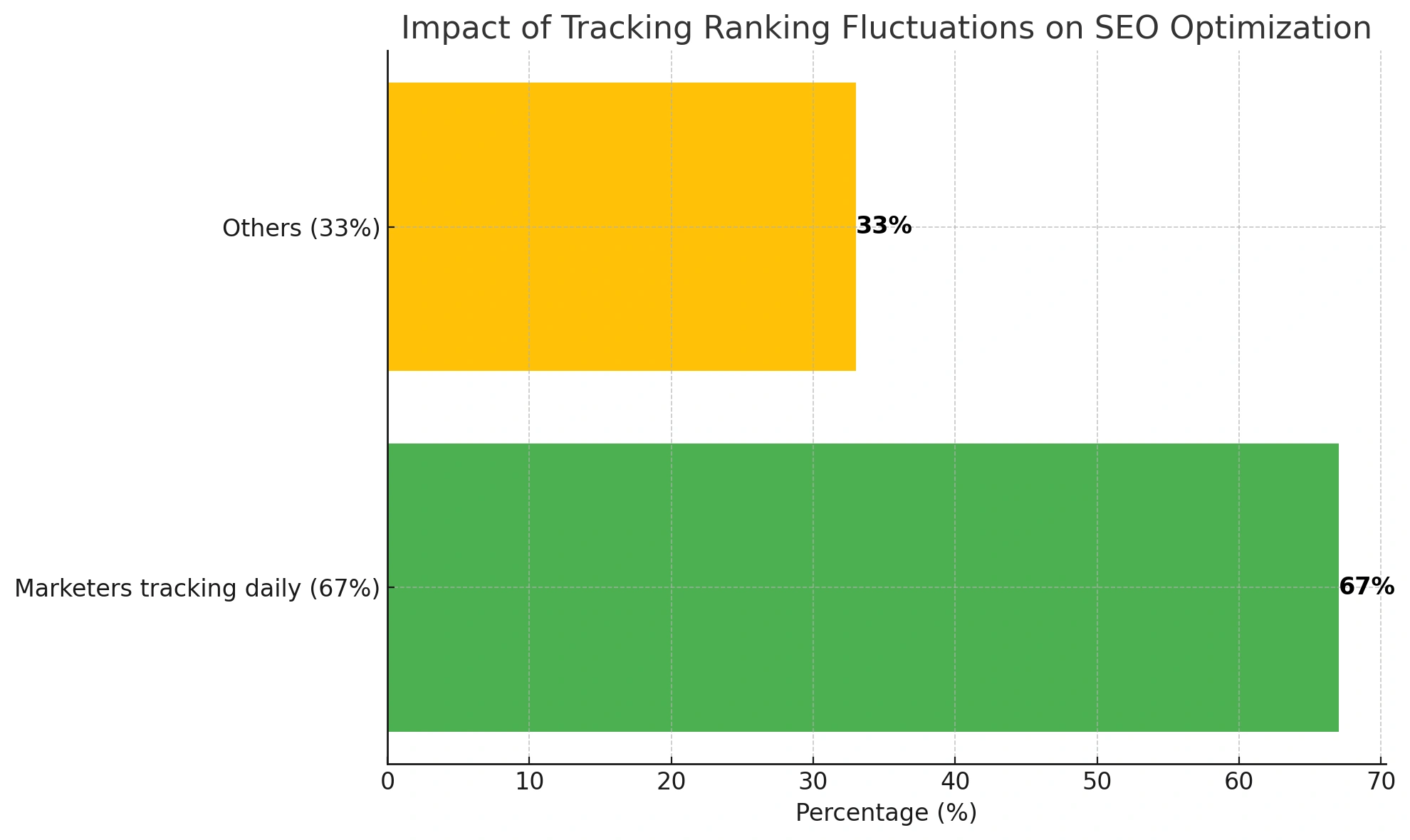
39% of sites that regularly A/B test their titles and meta tags see results in half the time compared to those who don’t.
Data-driven decisions help 28% of small brands pivot strategy by month 3, leading to faster gains in the latter half of the year.
Heatmap analysis helps reduce on-page friction, expediting conversions and improving SEO signals in as little as 2–3 months.
The Effect of Brand Authority & PR
PR coverage from top-tier news sites can cut the SEO timeline by 3–4 months thanks to high-authority backlinks.
Brand recognition speeds up click-through rates, with 1 in 5 brand searches leading to a boost in generic keyword rankings within 2 months.
23% of large brands see an instant SERP raise following a major press announcement, though sustaining it requires ongoing SEO.
Overall Success Rates & Conclusions
9 out of 10 marketers agree that consistent, high-quality SEO strategy yields noticeable traffic improvements within 6–12 months.
76% of companies that commit to SEO beyond 12 months end up with 40% more organic leads compared to those that do not.
57% of SMB owners regret not starting SEO earlier, as they typically discover it can take up to a year to see substantial growth.
83% of SEO clients renew their contracts after month 9, seeing the increasing benefits become more tangible.





